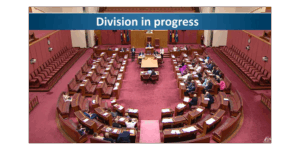Australian Government Passes Trumpian Deportation Laws Which Deny Procedural Fairness

On Thursday 4 September 2025, the Albanese government rammed through a set of new laws that serve to deny the right to procedural fairness in respect of noncitizens, which will ultimately streamline the process of deporting them from Australia to another country, and our home affairs minister has just cut a deal with the island nation of Nauru to dump our fellow human beings there.
Introduced without any prior warning on 26 August 2025, the Home Affairs Legislation Amendment (2025 Measures No. 1) Bill 2025 provides that the rules of procedural fairness, or natural justice, no longer apply to the removal of noncitizens to third countries or to the collection of information to facilitate deportation, as well as around use of their criminal histories and directions regarding removal.
Labor states the laws are being established in respect of a small number of people, the “NZYQ cohort”. Yet the Asylum Seeker Research Centre warns that coupled with the extreme migration laws passed in December 2024, these measures provide government with the ability to strip up to 80,000 people of their rights to procedural fairness and hence, could involve mass deportation.
These warnings become all the more serious when another out-of-the-blue Albanese government policy decision came to light on Friday, which involved the home affairs minister on a quick jaunt to Nauru to sign a memorandum of understanding, facilitating our government’s ability to dump noncitizens on the poor island nation, which, while spruiked as a $400 million deal, rises to billions.
Prime minister Anthony Albanese then appeared on the ABC’s Afternoon Briefing on Monday, to ensure host Patricia Karvelas that despite no prior warnings, the Nauru deal was “hardly secret”, and with a Trumpian rush of blood to the head, the federal Labor leader laid down that the deal is warranted as “people who have no right to be here need to be found somewhere to go”.
An attack on multiculturalism
“What this bill seeks to do is take away one of the most fundamental legal rights from people that you can,” explained Greens Senator David Shoebridge on Thursday, “take away the rights of natural justice, the right to be heard, before incredibly important decisions are made about you and your life and your future and your health.”
“In this case it is all about a toxic deportation deal that Labor has done with Nauru,” the Greens immigration spokesperson continued. “The toxic deportation deal done between the Albanese Labor government and Nauru is not a $400 million secret deal, it’s a $2.5 billion secret stitch up between Australia and Nauru to deport some of the most vulnerable people in this country.”
Procedural fairness or natural justice is the legal doctrine pertaining to fair treatment in legal process, which carries two stipulations: the rights to be free of bias and to be heard. The government has now removed these rights around the process of deporting a person to a third country, in terms of providing them with prior warning, as it claims noncitizens had been bucking the system via this.
The rights stripping laws of December 2024 and those complementing them this week have been rolled out specifically in relation to the 2023 High Court case NZYQ, which saw at least 354 immigration detainees, who were being held in indefinitely released into the community, because the ruling found detainment of an unlawful noncitizen with no real prospect of removal is illegal.
No prospect of deportation can be due to the principle of nonrefoulement contained in the Refugee Convention, which provides that states cannot return asylum seekers to a country where there is the potential for them to be harmed, as well as due to a person’s statelessness. Some of the NZYQ cohort do have serious criminal histories, while many do not, yet all are slated for deportation regardless.
Shoebridge underscored that the government is “bribing” Nauru to take in these people, treating it as “a dumping ground, a sort of modern 21st century penal colony, with almost no economy” and it “will be dependent upon Australia’s economic support”. The tiny island nation has been ravaged by decades of colonisation by various nations, including a joint UK, Australia and NZ administration.
Dumping people in another country
In terms of the Nauru deal, a media release was published last Friday afternoon, 29 August, outlining that the home affairs minister Tony Burke had met with Nauruan president David Adeang to sign a memorandum of understanding in regard to “undertakings for the proper treatment and long-term residence of people who have no legal right to stay in Australia, to be received in Nauru”.
“Australia will provide funding to underpin this arrangement and support Nauru’s long-term economic resilience,” the release reads. “In announcing the MOU, the president and minister referred to further long-term visas to be granted by Nauru to people who no longer have a legal right to remain in Australia. This MOU will allow the continued management of the NZYQ cohort.”
This deal involves a $408 million outlay, followed by an annual $70 million payment for the 30-year duration of the deal. As 354 NZYQ asylum seekers are to be deported, their deportation could cost the nation up to $2.5 billion. These individuals are currently living in the community and have been since the late 2023 court decision, which doesn’t cost taxpayers billions, and the sky has not fallen in.
The Howard government first started deporting asylum seekers and refugees to a processing centre on Nauru, as part of the Pacific Solution, in 2001, and this came to an end in 2008. The Gillard government then reopened it in 2012. The highest number of asylum seekers being detained on Nauru at any one moment by Australia occurred in August 2014 with 1,233 people detained there.
The Australian government was subsequently racked with claims of mass human rights violations taking place amongst the asylum seekers it had sent to Nauru, which included an extreme impact on children. The government denied media access to the island, while service providers were prevented from speaking out, via criminal offences that outlawed exposing the conditions on the island.
The major period of processing on Nauru that commenced in 2012 came to an end in March 2019. The 10-year-long instrument of designation that facilitates Australia’s deportation arrangements with Nauru lapsed in 2022, without the Albanese government noticing for months. So, Labor rushed to renew it for another 10 years in February 2023. This did result in crossbench condemnation.
The Australian Border Force intercepted 11 asylum seekers, including a child, at sea on 7 September 2023, and that marked the Albanese government’s recommencement of offshore processing after a nine year hiatus. Offshore detainees on Nauru have been increasing ever since. The Refugee Council of Australia notes that on 31 August 2025, this country has 94 people detained on Nauru.
Australia remains responsible
The Refugee Council further notes that Australia has sent 4,296 individuals, who arrived in Australian waters after risking their lives on the high seas, to offshore detention since 2012. And while the understanding that this is taking place is commonplace locally, the mandatory and indefinite Australian offshore immigration detention regime is internationally notorious for its extremes.
The UN High Commissioner for Human Rights published its decision on two cases related to asylum seekers detained on Nauru by this country on 9 January 2025, which found that Australia remained responsible for the people it discarded into offshore detention, and it underscored that “a state party can’t escape its human rights responsibility when outsourcing asylum processing to another state”
The hardline nature of the Australian regime has emboldened right-wing European politicians to contemplate similar measures, especially in the UK, while current US president Donald Trump did express admiration for the harshness of our nation’s immigration policy when he was first president in 2017, and currently, his nation is carrying out the mass deportation of undocumented immigrants.
The neo-colonial decision of the Australian government to dump over 300 people, whom it officially deems too dangerous to live in our community, upon the people of Nauru because they could do with the money is outrageous on its own, however as the ASRC has raised, these new laws could eventually be turned upon tens of thousands.
And the Albanese who appeared on the ABC on Monday afternoon, to wax lyrical about “people who have no right to stay here” being turfed out to elsewhere, and “if they can’t be sent back to their country of origin because of refoulement provisions… then we needed to find another country for them to go to”, is certainly not the hard-left human rights-advocating politician of past decades.







